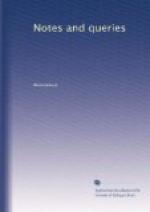J.I.
Trinity College, Oxford.
* * * * *
REPLIES TO MINOR QUERIES.
Origin of the Word “Snob".—I think that Snob is not an archaism, and that it cannot be found in any book printed fifty years ago. I am aware that in the north of England shoe-makers are still sometimes called Snobs; but the word is not in Brockett’s Glossary of North Country Words, which is against its being a genuine bit of northern dialect.
I fancy that Snobs and Nobs, as used in vulgar parlance, are of classic derivation; and, most probably, originated at one of the Universities, where they still flourish. If a Nob be one who is nobilis, a Snob must be one who is s[ine] nob[ilitate]. Not that I mean to say that the s is literally a contraction of sine; but that, as in the word slang, the s, which is there prefixed to language, at once destroys the better word, and degrades its meaning; and as, in Italian, an s prefixed to a primitive word has a privative effect—e.g. calzare, “to put on shoes and stockings;” scalzare, “to put them off:” fornito, “furnished;” sfornito, “unfurnished,” &c.; as also the dis, in Latin (from which, possibly, the aforesaid s is derived), has the like reversing power, as shown in continue and discontinue—so nob, which is an abbreviation of nobilis, at once receives the most ignoble signification on having an s put before it.
The word Scamp, meaning literally a fugitive from the field, one qui ex campo exit, affords another example of the power of the initial s to reverse the signification of a word.
All this, Mr. Editor, is only conjecture, in reply to “ALPHA’s” query (No. 12 p. 185.); but perhaps you will receive it, if no better etymology of the word be offered.
A.G.
Ecclesfield, Jan. 21. 1850.
Derivation(?) of “Snob” and “Cad."—I am informed by my son, who goeth to a Latin school, that Snob (which is a word he often useth) cometh of two Latin words; to wit, “sine obolo”—as who should say, “one that hath not a cross to bless himself.” He saith, that the man behind the omnibus is called “Cad,” “a non cadendo.” Your humble servant,
THE GOVERNOR.
* * * * *
Mr. Macaulay and Bishop Burnet.—The passage in which Mr. Macaulay calls Burnet “a rash and partial writer,” alluded to by your correspondent in No. 3. p. 40., occurs towards the end of his Essay on “Sir William Temple,” p. 456. of the new edition in one volume.
ETONIENSIS.
* * * * *
Circulation of the Blood.—“A.W.” (No. 13. p. 202.) is referred to Smith’s Dictionary of Biography, article NEMESIUS.




